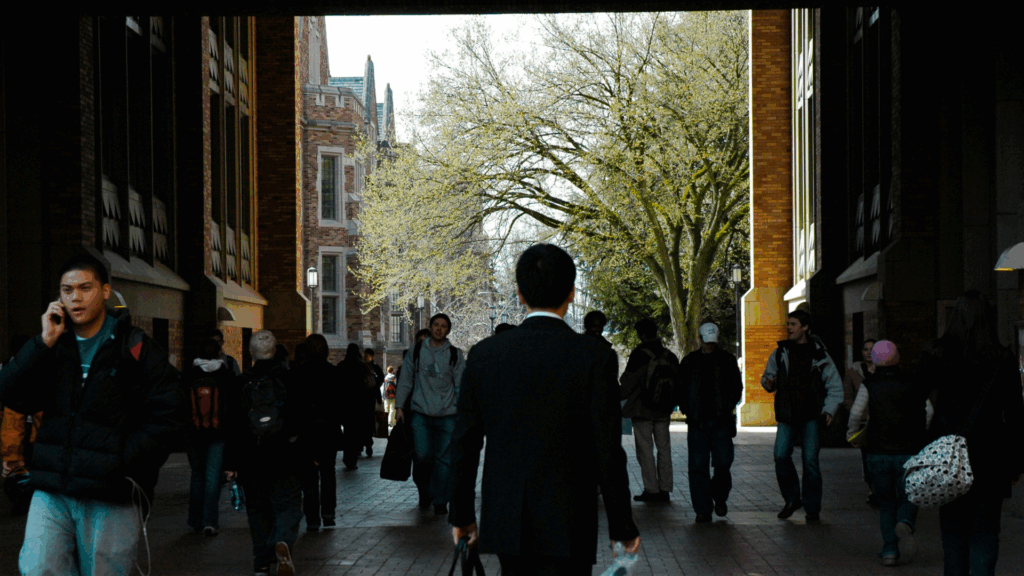THE GIFT OF FORTITUDE
Our human existence is marked by constant struggle: Militia est vita hominis super terram.[1] Man’s life on earth is warfare, sincethere are many enemies that try to impede his sanctification. Christian doctrine summarizes them all into three: the world, the flesh and the devil. They are those adventurers, in words of our Father, who take advantage of the weakness of that savage you have within you. In exchange for the poor bauble of pleasure, which is worth nothing, they want you to hand over to them the pure gold and the pearls, the diamonds and the rubies, drenched in the living and redeeming blood of your God—the price and the treasure of your eternity.[2]
If man were to rely only on his own strength, he could not be victorious in this battle for his happiness and salvation. What is man but a wind-driven leaf[3]who comes forth like a flower, and withers; he flees like a shadow, and continues not.[4] Man, with the human virtue of courage alone, and with his human nature after original sin, is incapable of reaching his God-given goal. We are called to live the Love of Christ, not little romances. Jesus Christ has won eternal happiness for us, which we have an inkling of here on earth, and which we will achieve if we strive to act with love of God.[5]
But our Lord has mercifully looked down on his creatures, and he has let us participate in his own life through grace and its company of infused virtues. Thus we can say we are victorious: quia tu es, Deus, fortitudo mea.[6] The infused virtue of fortitude is indispensable in the struggles of a Christian. It even can make up for a lack of human courage, when this is not due to one’s own fault. As our Founder assured us: you must have the judgment, the serenity, the fortitude, the sense of responsibility that many acquire after many years, in old age. You will have all this, in your youth, if you do not lose the supernatural outlook of a son of God. He will give you, more than to the old, the necessary qualities to carry out your work of an apostle.[7]
The Christian fortitude of a follower of Christ arms him for all the combats of his life; it lends him the strength needed to fulfill his duties as a son of God. But it does not take away spiritual sufferings and physical exhaustion that are part and parcel of human nature. With this virtue, vivified by charity, the Christian can be faithful to all his commitments to God, even though he is not spared the weariness and inevitable weaknesses that accompany our life here on earth.
In his fatherly love, God has provided an incomparable supernatural help for his children that perfects and makes both easy and prompt the actions proper to this virtue: the gift of fortitude. The Holy Spirit will then be the one who battles in us and through us, according to those words of God to Moses, sent by the Lord to Pharaoh to free the Israelites: I will be with you.[8] It is the same Spirit who filled the Apostles on Pentecost, to such an extent that those men who before had fallen fast asleep, who had been cowards and egotists, are now converted into champions for the faith, worthy of martyrdom, and true Apostles of Jesus Christ, who will preach throughout the world the ‘scandal’ of the Cross.[9] As our Father writes, the Holy Spirit, who is the spirit of strength, has made them firm, sure, daring.[10]
St Paul, who repeatedly experienced this divine strength, intones a hymn of triumph that human weakness would never have dreamed of; If God is for us, who is against us?… Who shall separate us from the love of Christ? Shall tribulation, or distress, or persecution, or famine, or nakedness, or peril, or sword?… No, in all these things we are more than conquerors through him who loved us. For I am sure that neither death, nor life, nor angels, nor principalities, nor things present, nor things to come, nor powers, nor height, nor depth, nor anything else in all creation, will be able to separate us from the love of God in Christ Jesus our Lord.[11]
If someone were to summarize all the effects of the gift off fortitude into one, he could say that it produces an insatiable desire for sanctity in the soul that does not put any obstacles in the way of its action. In the face of this desire, all the obstacles placed by the world, the flesh or the devil crumble like walls of paper. Sacred Tradition links it with the hunger and thirst for righteousness[12]that our Lord singled out as marking those who accept his message. And St Augustine affirms that “fortitude is suitable for those in hunger, since they suffer from the desire to enjoy true goods and from their eagerness to correct earthly compensation.”[13] And St Thomas comments: “the Lord wants us to desire this justice in such a fashion that we never feel satisfied in this life, just as a miser never feels satisfied.”[14]
The spirit of fortitude gives the soul an energy that is always fresh in order to put all the virtues into practice. All Christians need it to live faithfully the demands of their vocation, but those whom the Lord has called with a specific vocation to exercise an apostolic mission need it more. As St Theresa of Avila wrote, “it is most important— indeed, all important—that they should begin by making an earnest and determined resolution not to halt until they reach their goal (sanctity), whatever may come, whatever may happen to them, however hard they may have to labor, whoever may complain of them, whether they reach their goal or die on the road or have no heart to confront the trials they meet, whether the world dissolves before them.”[15]
In Opus Dei we especially note the need for this gift, because God asks us for heroic sanctity. It is a demand of the vocation we have received. We have to truly be authentic, canonizable saints; if not, we have failed. Authentic sanctity, without qualifications, without euphemisms, that reaches the last consequences; without mediocrity, in the plenitude of a vocation lived in its fullness.[16] This is the way our Founder always said, we have to be heroic. Sanctity alone is very little—therefore, we seek a great sanctity.[17]
It would be erroneous to think that a supernatural heroism must be limited to extraordinary situations such as martyrdom, serious setbacks, or the undertaking of great projects for the glory of God. Certainly in these cases an intense activation of the gifts of the Holy Spirit is necessary, and, concretely, of the gift of fortitude. The loss of one’s earthly life defending the faith is the most sublime act of this gift, so much so that the Church affirms that martyrdom immediately opens for the soul the gates of heaven. The history of Christianity recounts innumerable cases, even in modern times, in which this spirit of fortitude until death has inspired the conduct of Christians.
This extraordinary action of the Paraclete was present in many moments in the life of our Founder, who had to overcome so many difficulties to move the Work ahead and be faithful to the divine will, even at the risk of his life. The history of Opus Dei, its foundation and development, is a clear demonstration that the Lord’s hand is not shortened.[18] As our Father exclaimed on one occasion, in these thirty six years I have seen many heroic acts among your brothers, and I have had the impression of living among saints, capable of obeying usque ad mortem, mortem autem crucis (Phil 2:8). I have seen brothers of yours, knowing full well that their life was at stake, serenely make marvelous acts of obedience, for of the Holy Church, for the sake of the Roman Pontiff, for the sake serving.[19]
In another moment, he told us: in the history of our Work of God there are many heroic examples of service, holy, full of a marvelous supernatural audacity. And you should realize that heroism, sanctity and daring require a constant spiritual preparation. We always will give of what we have.[20] And he added that, although it was not our vocation, we would accept the grace of martyrdom like a caress from God; not for us but for our family of Opus Dei, so that pride not conquer us even in this. We will not lack this caress… But it won’t happen often, because it is not our way.[21]
By God’s explicit will, ours is “a way of sanctification in daily work and in the fulfillment of the Christian’s ordinary duties,”[22] and it is there that we must wage the battles for the glory of God and the good of souls, with the strength of the Holy Spirit.
Together with heroism in great things, there is a heroism of little things, which at times is more difficult. The gift of fortitude gives the impulse Christians need to conduct themselves heroically, fleeing mediocrity in everything they do. Many, who would let themselves be nailed to a cross before the astonished gaze of thousands of spectators, won’t bear the pinpricks of each day with a Christian spirit! But think, which is the more heroic.[23]
Heroism is to correspond to God’s will always, one day and the next, when it suits our feelings, and when it does not, with a perseverance that is the fruit of love. It is heroic to spend oneself hour after hour in an apparently trivial task, like the donkey turning the waterwheel, and die unnoticed in a comfortable bed like a bourgeois, but to die of Love.[24] Heroism is the fulfillment of the program our Father wrote for us: to be an apostle and not call yourself an apostle, to be a missionary —with a mission— and not call yourself a missionary, to be a man and of God and to seem a man of the world: to pass unnoticed!.[25] Ordinary life, then offers ample opportunity for the activity of the spirit of fortitude, since our life, lived with fidelity, is heroic.[26]
In order to combat any temptation to dream of exotic but unattainable enterprises, while neglecting duties at hand, our Founder warned us: do not be taken up with grand thoughts of heroism. Be attentive to the reality of each day, striving carefully for perfection in your ordinary work. There is where God awaits us. Each day we have the chance to give an affirmative reply. And it is this affirmation that must be heroic, trying to surpass oneself, without placing any limits.[27]
Like the moral virtue that it engenders and perfects, the gift of fortitude encourages people to both initiate difficult projects for the glory of God and the good of souls, and to bear adversity patiently, with a smile on their lips and serenity in their soul. The arena of its activity is, above all, the ascetical struggle and the apostolate. To renew the effort to achieve sanctity once and again, conquering the monotony of days apparently alike, is something heroic, and can be sustained only with the help of the divine Spirit. The gift of fortitude thus becomes the chief recourse against lukewarmness in the spiritual life, against the tiredness that tries to spoil the demands of our dedication and interior battle. A person who begins the fight again without weakening, despite the partial setbacks he encounters along the way, is strong, and is guided by the inspirations of the divine Paraclete. His life is the heroism of little, normal things, those of every day. They are not always the same! Every day has another color, another vibration, another tone, when there is love![28]
To persevere cheerfully in the apostolate one day after another, when one gathers the fruits of one’s work and when they are not apparent, is also heroic, and can only be the result of the action of the Holy Spirit. There, then, in the interior spiritual struggle, and in that other struggle to give glory to God and to achieve effective apostolates in the service of God, and of men, in the service of the Church … In those struggles have faith, trust! ‘But Father,’ you say, ‘what about my sins?’ And I reply, and what about mine? Ne respicias peccata nostra sed fidem (Ordo Missae). And we will remember those other words of Scripture, quia tu es, Deus, fortitudo mea (Ps 42:2). I am no longer afraid, for you, Lord, will look upon my faith rather than upon my failings, and you are my strength. And these children of mine —I present all of you to God— are also my strength: strong determined, sure, serene, victorious![29]
The gift of fortitude allows us to joyfully bear any suffering, whether physical or spiritual. The Apostles, after being beaten by the Sanhedrin, rejoiced that they were counted worthy to suffer dishonour for the name.[30] Amidst pain, poverty, persecution, in all that the world calls evil, the child of God, moved by the Holy Spirit, knows how to find Christ and identify himself with him. Because of this, all the saints have loved suffering, and have joyfully embraced penance.
To us too, our Lord has given us the system to follow, in Opus Dei, so that the cross that he himself imposes on us —or which he permits circumstances, things, or persons around us to impose on us— so that this Cross that he has made for us does not weigh on us. And that system is to love Christ’s Cross. It means carrying the Cross serenely, squarely on our shoulders, without letting it fall, without dragging it. It means to embrace setbacks, whether they be internal or external, and to know that they all have their purpose and that they are all a wonderful treasure. If it is truly Christ’s Cross, it will not weigh on us, because it is not ours. lt is no longer mine but his, and he carries it with me. In this way, my children, every sorrow is quickly overcome, and no one will be able to take away our peace and our joy.[31]
Here we find the deepest meaning of the necessity for Christian penance and mortification; they are not simply means to fight the bad tendencies of our fallen nature, but more importantly, they are means to identify ourselves more and more with Jesus Christ. For this reason they will never be obsolete even though some people may not understand their importance. And for this reason, too, we live them in the Work in the way they have traditionally been lived in the Church.
The gift of fortitude, which is so necessary in our path toward heaven, is obtained from God through prayer and the sacraments. The sacrament of Confirmation seals us with the character of a soldier of Christ and gives us the fullness of the Holy Spirit for spiritual battles. In the Anointing of the Sick, the Lord himself strengthens his faithful for the last battle, that which decides their ultimate destiny. While we still journey here on earth, however, God sustains us by means of Penance and the Eucharist. The sacramental grace of Confession fortifies the soul specifically for the fight against sin and temptation, while the Holy Eucharist, food of the mighty,[32] is the nourishment that restores our strength spent in the combat for the glory of God. Here we find the inexhaustible resources of Christian fortitude, which the Holy Spirit pours out generously into souls that are well prepared.
Besides these means, the gift of fortitude is also made possible by the habitual practice of mortification, courage in the face of suffering, the exact fulfillment of duty, especially if it is unpleasant. God expects all these from each of us, even though we personally feel our weaknesses, because he wants the Work to be effective —with our correspondence— until the end of time, collaborating as part of the Church toward the restoration of all things in Christ. With this certainty in our hearts, we have to remain always contemplative and serene. Even though the world collapse, our Father tells us, even though everything be lost, even though everything shatter, we must not. If we are faithful, we will have the fortitude of the person who is humble, because he lives identified with Christ. My children, we are the permanent ones; the rest will pass. There is nothing to worry about![33]
The adventure of the Christian on earth is a great battle against evil, which many times is hidden but other times is visible. The most holy Virgin Mary, closer to Christ than any other creature was or ever will be, cooperates with the Redeemer in crushing the head of the infernal serpent. The Mother of God irradiates a superhuman fortitude in this fight. We remember her long years in Nazareth, strong in faith and in love. We see her, too, at the foot of the Cross, in the greatest of human sorrow (there is no sorrow like hers), filled with fortitude.[34] We contemplate her triumphant in heaven with her Son, as Queen of all creation and channel of all grace.
What security is ours when, in this battle that exceeds our human strength, we fly to the protection of the Most Holy Virgin! Ipsa tenente, non corruis! If she sustains you, you will never fall, St. Bernard exclaimed. Ipsa duce, non fatigaris! If she leads you, you will never tire. Ipsa propitia, pervenis! If she helps you, you will arrive: you can be sure you will finish.[35] Mary, Virgo potens, will obtain for us from her divine Spouse all the supernatural energy we need to be saints.
[1]Job 7:1
[2]The Way, no. 708
[3]Job 13:25
[4]Job 14:2
[5]De nuestro Padre, no. 155
[6]Ps 42:2
[7]From our Father, in Crónica February 1961 p. 13
[8]Ex 3:12
[9]From the Father, Get-together, 6 June 1977, in Crónica 1977, p.829
[10]Christ Is Passing By, no. 127
[11]Rom 8:31-39
[12]Mt 5:6
[13]St Augustine, Super Matth De Sermo Domini in Monte, 1, 4, 11
[14]St Thomas, Lectura, Super Matth. c. V, lect. 2
[15]St Theresa of Jesus, Way of Perfection, 21, 2
[16]From our Father, in Crónica November 1959, p. 9
[17]From our Father, in Crónica November 1959, p. 9
[18]Is 59:1
[19]From our Father, Meditation To Live for the Glory of God, 21 November 1954, in Crónica 1975, pp. 535-536
[20]From our Father, Get-together, 6 October 1968, in Crónica 1968, p.1080
[21]From our Father, Meditation To Live for the Glory of God, 21 November 1954, in Crónica 1975, pp. 535-536
[22]Prayer for the private devotion to our Father
[23]The Way, no. 204
[24]The Way, no. 743
[25]The Way, no. 848
[26]De nuestro Padre, no. 182
[27]From our Father, Get-together, 6 October 1968, in Crónica 1968, p. 1080
[28]From our Father, in Crónica March 1959, pp. 10-11
[29]From our Father, Meditation, 3 December 1961, in Meditations I, pp. 12-13
[30]Acts 5:41
[31]From our Father, Meditation, 3 March 1963, in Crónica 1974, p. 1017
[32]Cf St Augustine, Confessions, VII, 10
[33]From our Father Meditation, 21 November 1954, in Crónica no. 535
[34]The Way, no. 508
[35]From the Father, Letter, 2 February 1979. no. 14
Article by Unknown
Photo by Jonas Allert on Unsplash



